Charles E W Bean, Diaries, AWM38 3DRL 606/17/1 - September - October 1915 - Part 5
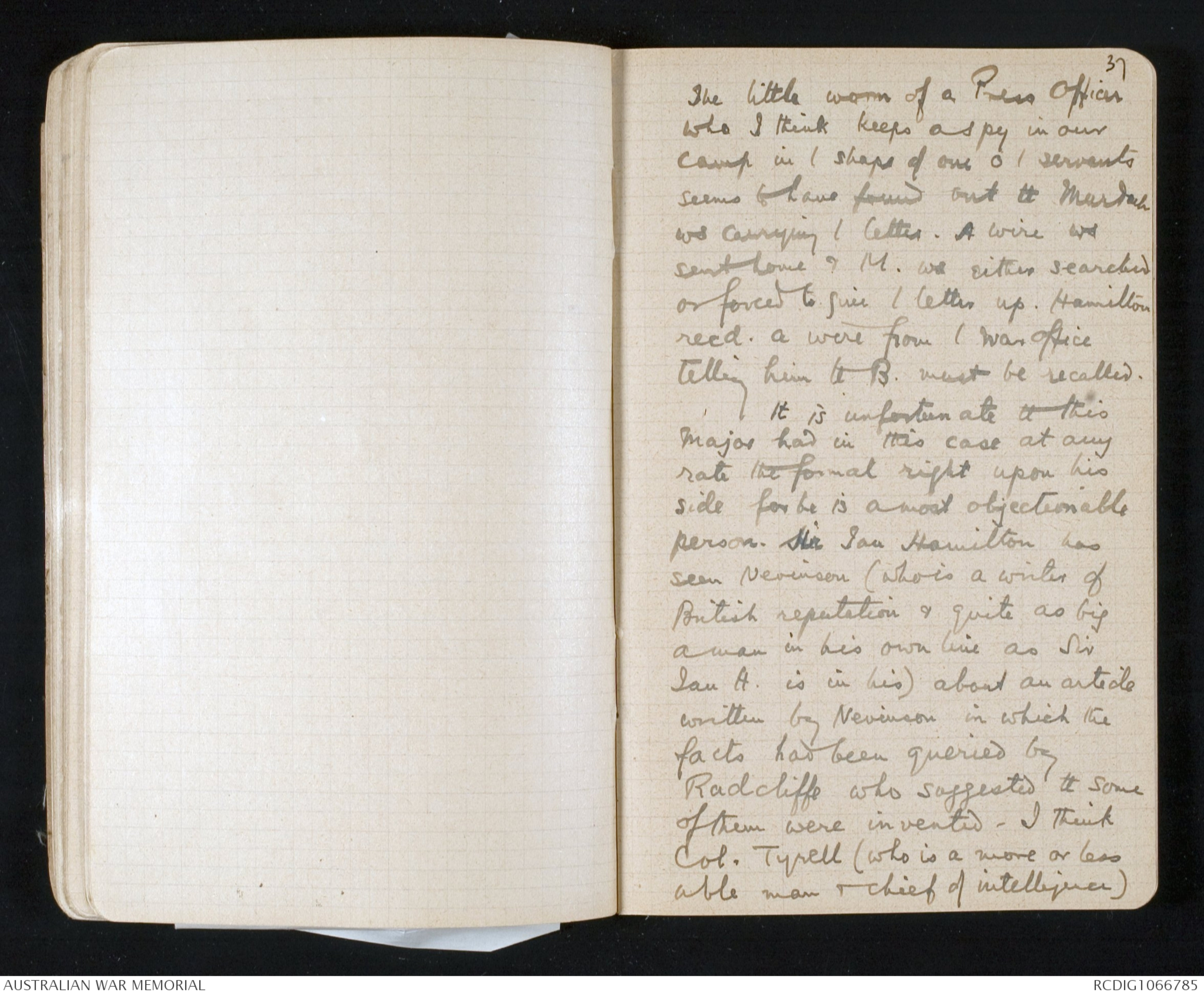
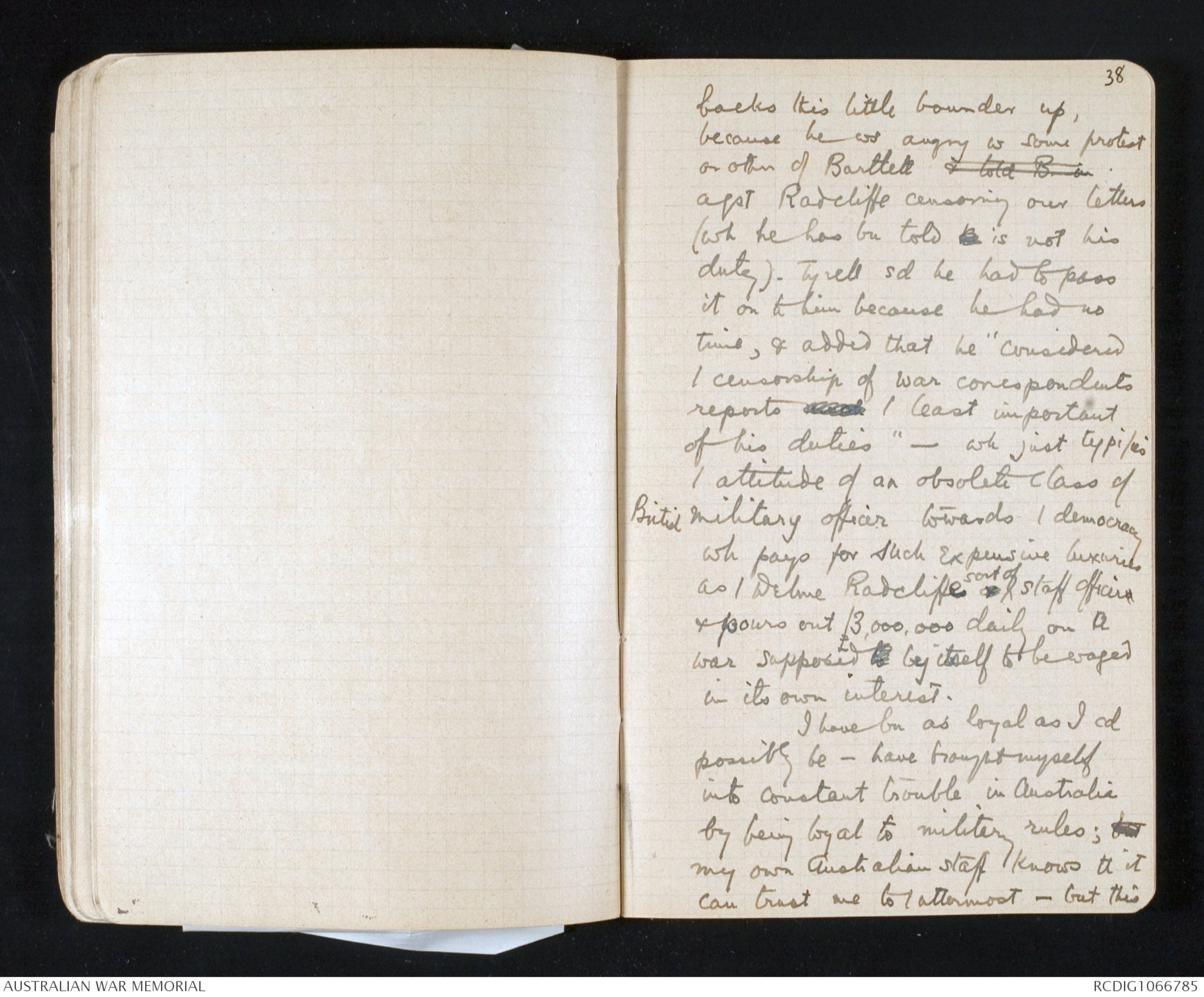
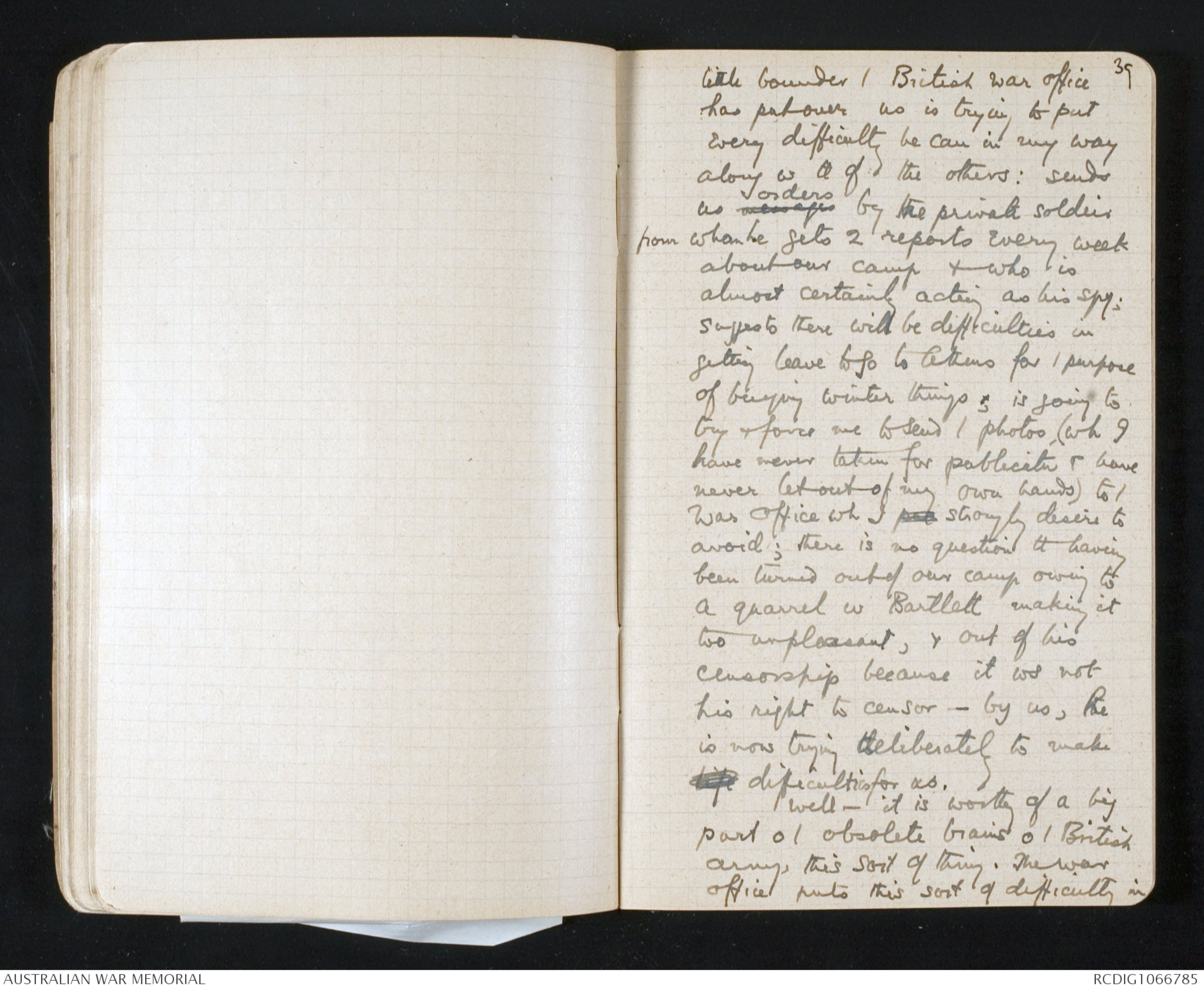
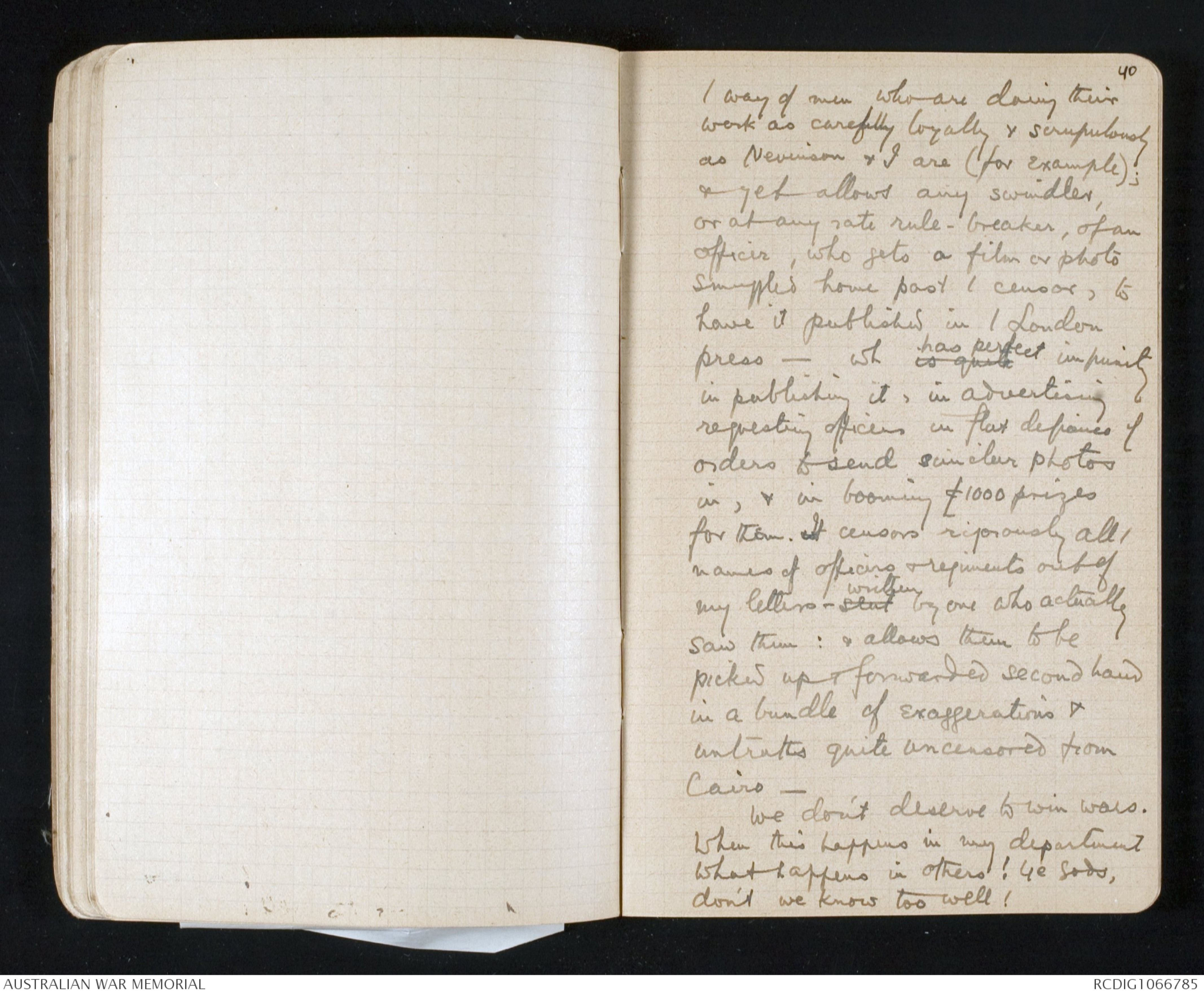
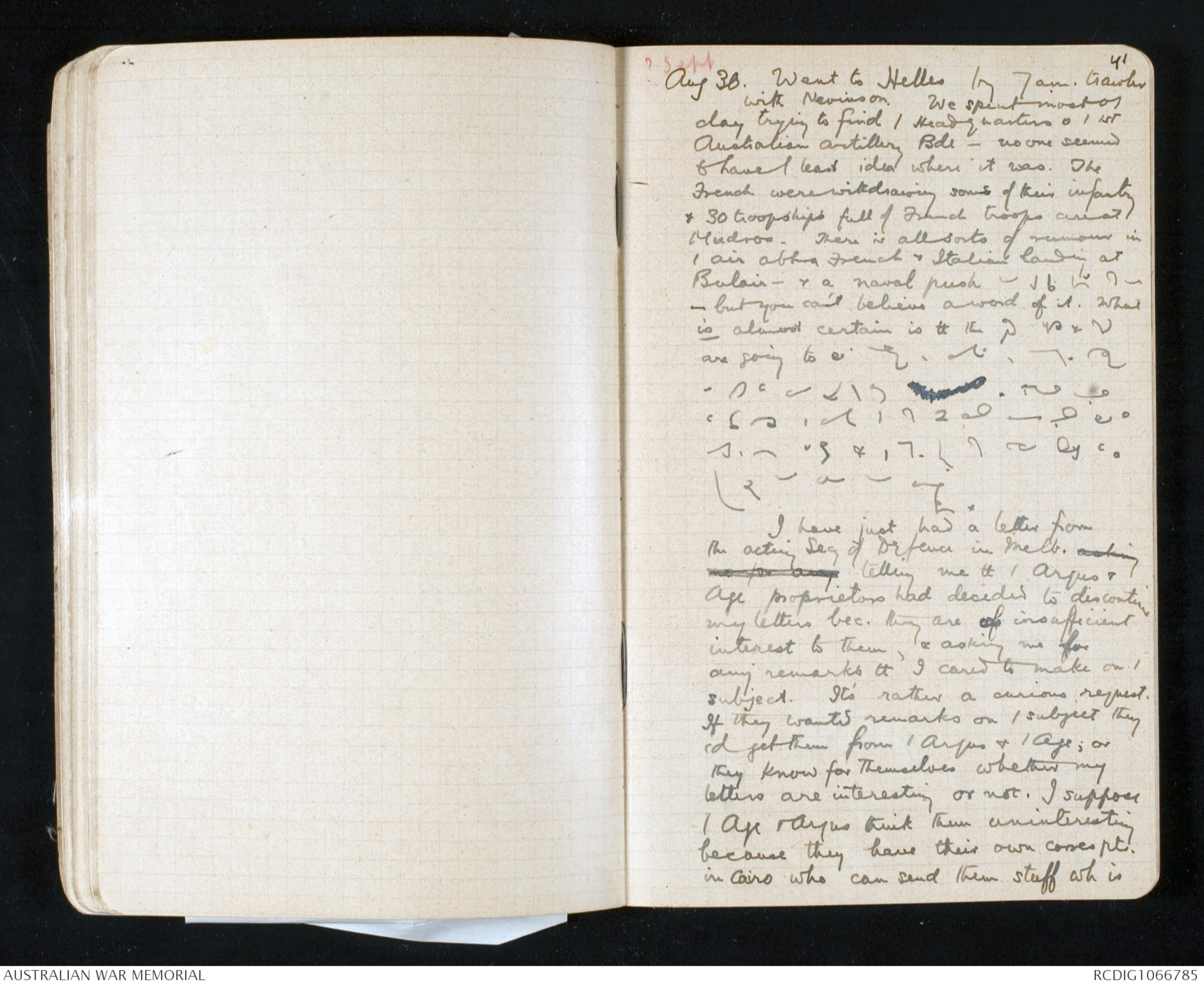
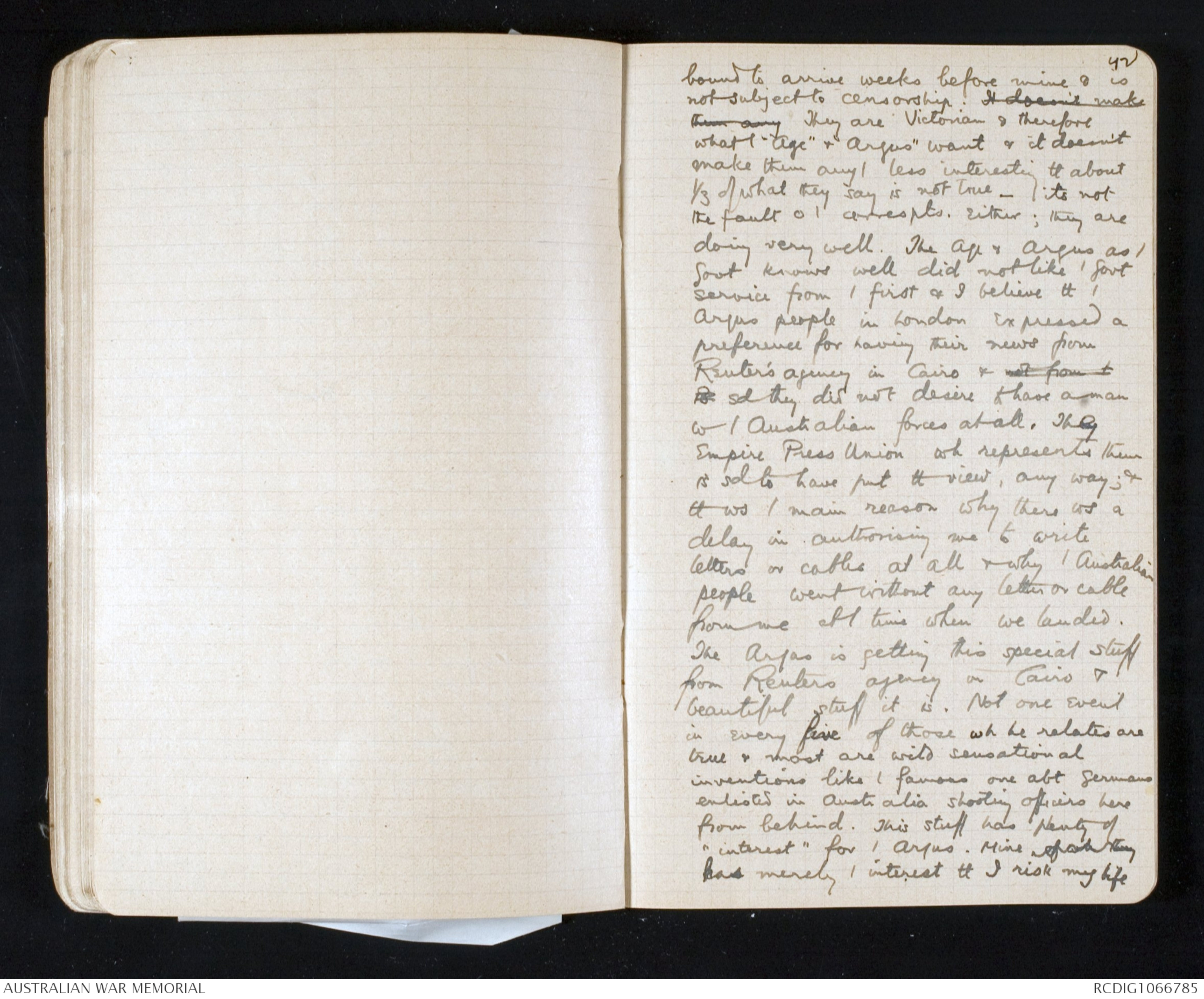
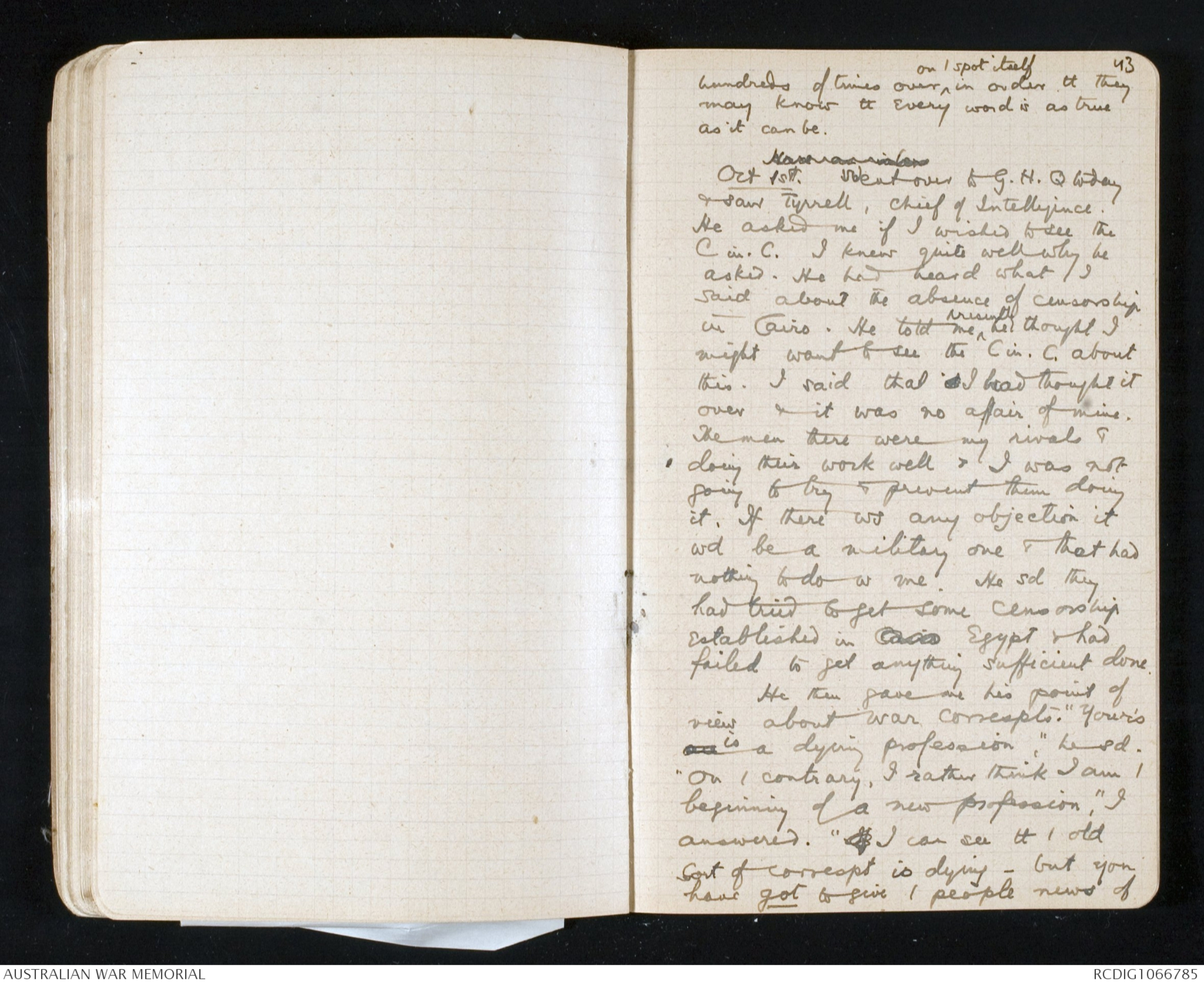
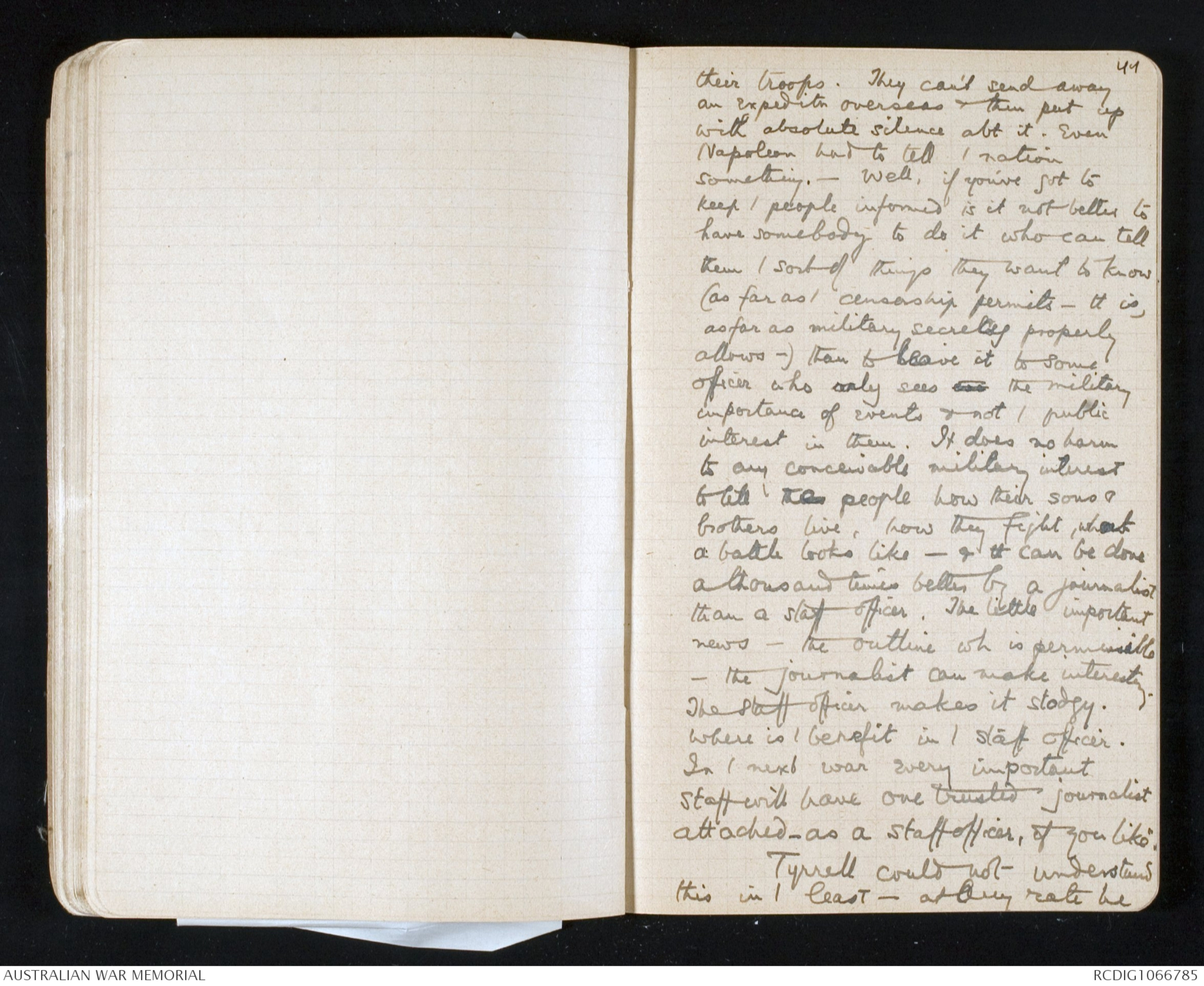
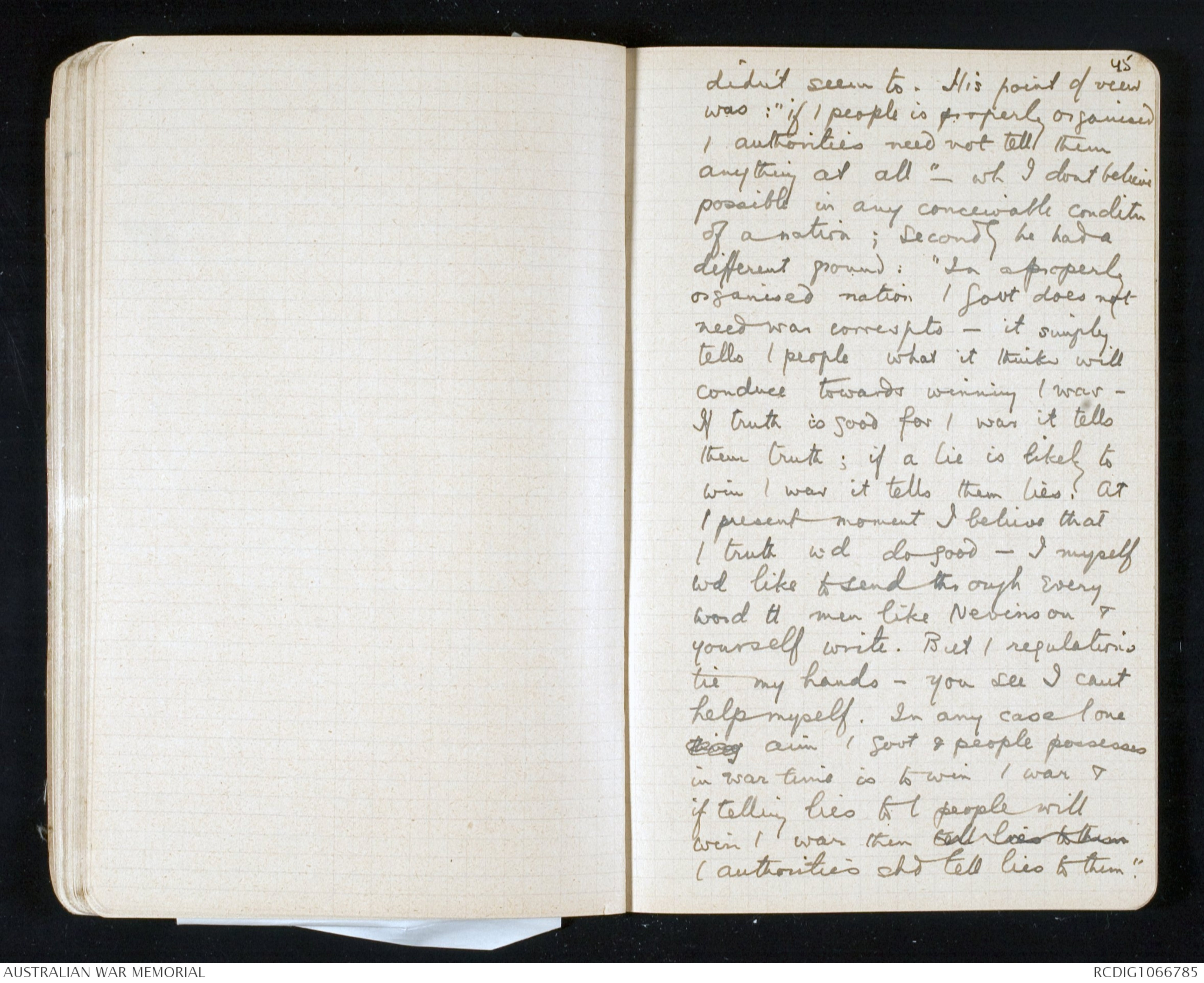
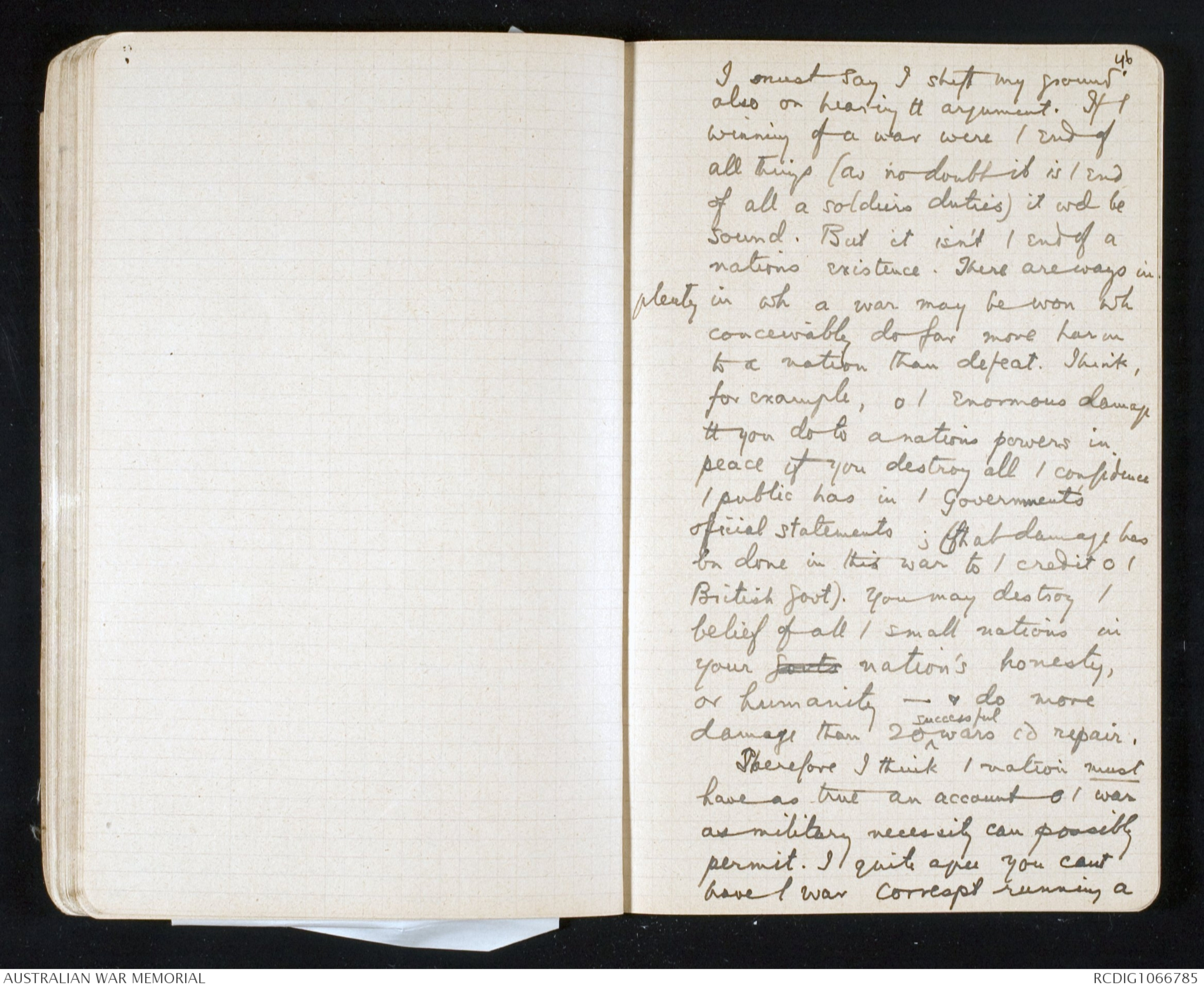
37
The little worm of a Press Officer
who I think keeps a spy in our
camp in / shape of one o / servants
seems to have found out tt Murdoch
was carrying / letter. A wire ws
sent home & M. ws either searched
or forced to give / letter up. Hamilton
recd. a wire from / War Office
telling him tt B. must be recalled.
It is unfortunate tt this
Major had in this case at any
rate the formal right upon his
side for he is a most objectionable
person. Sir Ian Hamilton has
seen Nevinson (who is a writer of
British reputation & quite as big
a man in his own line as Sir
Ian H. is in his) about an article
written by Nevinson in which the
facts had been queried by
Radcliffe who suggested tt some
of them were invented. I think
Col. Tyrell (who is a more or less
able man & chief of intelligence)
38
backs this little bounder up,
because he ws angry w some protest
or other of Bartlett & told B. in
agst Radcliffe censoring our letters
(wh he has bn told xx is not his
duty). Tyrell sd he had to pass
it on to him because he had no
time, & added that he "considered
/ censorship of war correspondents
reports xxxx / least important
of his duties" – wh just typifies
/ attitude of an obsolete class of
British military officer towards / democracy
wh pays for such expensive luxuries
as / Delme Radcliffe x ^sort of staff officers
& pours out £3,000,000 daily on a
war supposed xx by itself to be waged
in its own interest.
I have bn as loyal as I cd
possibly be - have brought myself
into constant trouble in Australia
by being loyal to military rules; but
my own Australian staff knows tt it
can trust me to / uttermost - but this
39
little bounder / British war office
has put over us is trying to put
every difficulty he can in my way
along w tt of the others: sends
us messages orders by the private soldier
from whom he gets 2 reports every week
about our camp & who is
almost certainly acting as his spy;
suggests there will be difficulties in
getting leave to go to Athens for / purpose
of buying winter things; is going to
try & force me to send / photos, (wh I
have never taken for publicatn & have
never let out of my own hands) to /
War Office wh I pat strongly desire to
avoid; there is no question tt having
been turned out of our camp owing to
a quarrel w Bartlett making it
too unpleasant, & out of his
censorship because it ws not
his right to censor - by us, he
is now trying deliberately to makelife difficulties for us.
Well - it is worthy of a big
part o / obsolete brains o / British
army, this sort of thing. The war
office puts this sort of difficulty in
40
/ way of men who are doing their
work as carefully loyally & scrupulously
as Nevinson & I are (for example);
& yet allows any swindler,
or at any rate rule-breaker, of an
officer, who gets a film or photo
smuggled home past / censor, to
have it published in / London
press - wh is quite has perfect impunity
in publishing it, in advertising
requesting officers in flat defiance of
orders to send similar photos
in, & in booming £1000 prizes
for them. It censors rigorously all /
names of officers & regiments out of
my letters - sent written by one who actually
saw them: & allows them to be
picked up & forwarded second hand
in a bundle of exaggerations &
untruths quite uncensored from
Cairo -
We don't deserve to win wars.
When this happens in my department
what happens in others! Ye Gods,
don't we know too well!
41
[*? Sept*]
Aug 30. Went to Helles by 7a.m. trawler
with Nevinson. We spent most o /
day trying to find / Headquarters o / 1st
Austalian Artillery Bde - no one seemed
to have / least idea where it was. The
French were withdrawing some of their infantry
& 30 troopships full of French troops are at
Mudros. There is all sorts of rumour in
/ air abt a French & Italian landing at
Bulair - & a naval push - [[shorthand]]
- but you can't believe a word of it. What
is almost certain is tt the [[shorthand]]
are going to [[shorthand]]
[[shorthand]]
I have just had a letter from
the acting Secy of Defence in Melb. asking me for any telling me tt / Argus &
Age proprietors had decided to discontinue
my letters bec. they are of insufficient
interest to them, & asking me for
any remarks tt I cared to make on /
subject. It's rather a curious request.
If they wanted remarks on / subject they
cd get them from / Argus & / Age; or
they know for themselves whether my
letters are interesting or not. I suppose
/ Age & Argus think them uninteresting
because they have their own correspts.
in Cairo who can send them stuff wh is
42
bound to arrive weeks before mine & is
not subject to censorship. It doesn't makethem any They are Victorian & therefore
what / "Age" & "Argus" want & it doesn't
make them any / less interesting tt about
1/3 of what they say is not true- its not
the fault o / correspts. either; they are
doing very well. The Age & Argus as /
Govt knows well did not like / Govt
service from / first & I believe tt /
Argus people in London expressed a
preference for having their news from
Reuter's agency in Cairo & not from txx sd they did not desire to have a man
w / Australian forces at all. The
Empire Press Union wh represents them
is sd to have put tt view, any way; &
tt ws / main reason why there ws a
delay in authorising me to write
letters or cables at all & why / Australian
people went without any letter or cable
from me at / time when we landed.
The Argus is getting this special stuff
from Reuters agency in Cairo &
beautiful stuff it is. Not one event
in every five of those wh he relates are
true & most are wild sensational
inventions like / famous one abt Germans
enlisted in Australia shooting officers here
from behind. This stuff has plenty of
"interest" for / Argus. Mine es wh they
has merely / interest tt I risk my life
43
hundreds of times over ^on / spot itself in order tt they
may know tt every word is as true
as it can be.xxxxxxxxxxxx
Oct 1st. Went over G.H.Q today
& saw Tyrrell, Chief of Intelligence.
He asked me if I wished to see the
C in. C. I knew quite well why he
asked. He had heard what I
said about the absence of censorship
in Cairo. He told me ^presently he thought I
might want to see the C in. C. about
this. I said that xx I had thought it
over & it was no affair of mine.
The men there were my rivals &
doing their work well & I was not
going to try & prevent them doing
it. If there ws any objection it
wd be a military one & that had
nothing to do w me. He sd they
had tried to get some censorship
established in Cairo Egypt & had
failed to get anything sufficient done.
He then gave me his point of
view about war correspts. "Your'sare is a dying profession," he sd.
"On / contrary, I rather think I am /
beginning of a new profession," I
answered. "H I can see tt / old
sort of correspt is dying - but you
have got to give / people news of
44
their troops. They can't send away
an expeditn overseas & then put up
with absolute silence abt it. Even
Napoleon had to tell / nation
something. - Well, if you've got to
keep / people informed is it not better to
have somebody to do it who can tell
them / sort of things they want to know
(as far as / censorship permits - tt is,
as far as military secrecy properly
allows -) than to leave it to some
officer who only sees xxx the military
importance of events & not / public
interest in them. It does no harm
to any conceivable military interest
to tell the people how their sons &
brothers live, how they fight, what
a battle looks like - & tt can be done
a thousand times better by a journalist
than a staff officer. The little important
news - the outline wh is permissable
- the journalist can make interesting.
The Staff officer makes it stodgy.
Where is / benefit in / staff officer.
In / next war every important
staff will have one trusted journalist
attached - as a staff officer, if you like".
Tyrrell could not understand
this in / least - at any rate he
45
didn't seem to. His point of view
was: "if / people is properly organised
/ authorities need not tell them
anything at all" - wh I dont believe
possible in any conceivable conditn
of a nation; Secondly he had a
different ground: "In a properly
organised nation / Govt does not
need war correspts - it simply
tells / people what it thinks will
conduce towards winning / war -
If truth is good for / war it tells
them truth; if a lie is likely to
win / war it tells them lies. At
/ present moment I believe that
/ truth wd do good - I myself
wd like to send through every
word tt men like Nevinson &
yourself write. But / regulations
tie my hands - you see I cant
help myself. In any case / onething aim / Govt & people possesses
in war time is to win / war &
if telling lies to / people will
win / war then tell lies to them
/ authorities shd tell lies to them."
46
I must say I shift my ground
also on hearing tt argument. If /
winning of a war were / end of
all things (as no doubt it is / end
of all a soldiers duties) it wd be
sound. But it isn't / end of a
nations existence. There are ways in
plenty in wh a war may be won wh
conceivably do far more harm
to a nation than defeat. Think,
for example, o / enormous damage
tt you do to a nations powers in
peace if you destroy all / confidence
/ public has in / Government's
official statements; (that damage has
bn done in this war to / credit o /
British Govt). You may destroy /
belief of all / small nations in
your Govts nation's honesty,
or humanity - & do more
damage than 20 ^successful wars cd repair.
Therefore I think / nation must
have as true an account o / war
as military necessity can possibly
permit. I quite agree you cant
have / war correspt running a
 Arlene Baade
Arlene BaadeThis transcription item is now locked to you for editing. To release the lock either Save your changes or Cancel.
This lock will be automatically released after 60 minutes of inactivity.